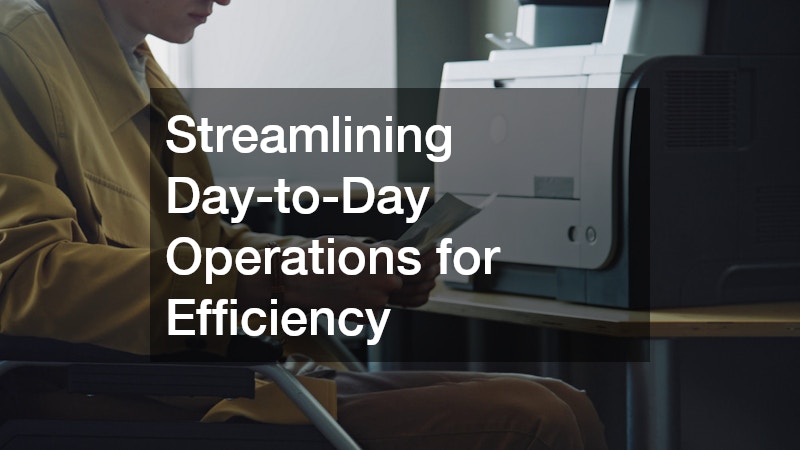
Every successful business begins with a vision — a bold idea that solves a problem or fulfills a need. Yet, as that idea grows into a larger operation, success becomes less about inspiration and more about preparation. Building a strong foundation requires more than passion or a good product. It demands structure, careful planning, and a reliable network of services that keep daily operations stable, safe, and sustainable, while also supporting flexibility for future growth and unexpected challenges.
Many organizations fail not because of poor sales, but because they overlook the essential elements that support long-term growth. As a company expands, it faces new challenges — financial, logistical, and structural — that require professional attention and strategic foresight. The same systems that worked for a startup might not hold up under the demands of a larger operation. From managing finances and security to maintaining facilities and infrastructure, each overlooked detail can create significant vulnerabilities and slow progress if not addressed properly.
The most successful leaders understand that long-term stability depends on preparation, careful planning, and ongoing evaluation. Having proper coverage, dependable partners, and efficient systems in place allows a company to operate confidently, adapt to change, and seize opportunities as they arise. This article explores ten critical yet often underestimated aspects of building a thriving enterprise. Each section highlights an essential component, showing how careful planning, professional support, and attention to detail form the backbone of a resilient organization — one prepared not only to grow but to endure and flourish over time.

Protecting Your Investment from Day One
Every business carries inherent risks, and mitigating those risks starts with the right protection. Business insurance is one of the first — and most crucial — investments any company should make. It provides financial protection against unforeseen events such as property damage, liability claims, theft, or natural disasters.
Beyond simple coverage, the right insurance plan reflects the unique needs of the business. For example, a construction firm requires vastly different protection than a retail shop or digital agency. Comprehensive insurance often includes property coverage, liability insurance, and business interruption protection, which can cover lost income if operations are disrupted.
Too often, business owners view insurance as a formality rather than a strategic safeguard. In reality, it’s the foundation of risk management. A strong policy allows leaders to focus on innovation and growth, knowing their assets, employees, and reputation are secure. Without adequate insurance, even a minor setback can cause major financial strain — especially for small or expanding businesses that lack the reserves to recover quickly.
Safeguarding Your Operations and Data
In an increasingly digital world, business protection goes far beyond locks and keys. The modern company must defend both its physical and virtual assets, which is where business security systems play a vital role.
A well-designed security system combines multiple layers of defense — surveillance cameras, alarm systems, access control, and cybersecurity tools — to protect facilities and data from potential threats. As operations grow and more employees handle sensitive information, the risk of data breaches and internal theft increases. Modern systems integrate smart technology, allowing owners and managers to monitor activity remotely and receive instant alerts if something unusual occurs.
Security systems also contribute to a safer workplace environment. Employees feel more confident knowing their workspace is protected, and clients trust businesses that prioritize privacy and safety. For organizations that store customer data or expensive equipment, security isn’t a luxury — it’s a necessity.
Investing in comprehensive protection enhances efficiency, reduces liability, and preserves the company’s credibility in an era when trust and safety are key to maintaining customer loyalty.
Managing Money the Smart Way
Financial management is often the first sign of whether a business will thrive or struggle. As a company expands, its accounting needs become more complex, making the guidance of a business tax accountant invaluable.
A qualified accountant helps navigate tax regulations, ensures compliance, and identifies opportunities for savings. Beyond filing returns, they assist with financial forecasting, cash flow management, and strategic planning. The right accountant becomes a trusted advisor who understands the nuances of your industry and helps make decisions that support sustainable growth.
Businesses that attempt to manage taxes internally often overlook critical deductions or misinterpret regulations, leading to penalties or missed opportunities. A dedicated professional keeps the company organized and prepared for audits while ensuring every dollar is used effectively.
As the business grows, an accountant’s role expands as well — from routine bookkeeping to complex budgeting and financial strategy. Their insight supports every major decision, whether it involves hiring, expansion, or capital investment.

Maintaining the Integrity of Your Physical Space
A growing company needs a safe, reliable physical environment. Yet, one of the most neglected parts of any building is the roof. Hiring an expert roofer ensures that your facility remains structurally sound and well-protected against the elements.
A damaged or aging roof can lead to leaks, mold, and insulation problems, all of which can disrupt business operations and damage property. Regular maintenance not only extends the life of the building but also improves energy efficiency by maintaining proper ventilation and temperature control.
Businesses that invest in professional roofing services protect themselves from costly repairs down the road. Experienced roofers can identify potential issues before they become emergencies and recommend durable materials suited to local weather conditions.
The physical integrity of a business property reflects its reliability. Whether your operation involves customers, employees, or inventory, maintaining your building is as essential as managing finances or marketing — because it safeguards everything that happens within those walls.
Supporting Specialized Industrial or Research Needs
Not all businesses operate in office spaces or storefronts. Many rely on specialized equipment and technical components that require precision and quality assurance. The high pressure electrical feedthrough is one such example — a critical device used in manufacturing, laboratory, or engineering environments where electrical currents must pass safely through pressurized systems.
This type of component might seem niche, but it represents a broader principle: investing in reliable, high-quality materials and equipment. In industrial and research settings, even minor equipment failures can halt production, damage machinery, or compromise safety.
A business operating in these fields must build partnerships with trusted suppliers who understand technical standards and can provide products that meet or exceed compliance requirements. Attention to detail in equipment sourcing ensures consistent performance, reduces downtime, and supports innovation.
In today’s competitive industrial landscape, reliability is everything. Businesses that prioritize quality — down to the smallest components — are those that maintain steady production and customer trust.
Powering Growth Safely and Efficiently
No business can function without power, yet electrical infrastructure often goes unnoticed until something goes wrong. Professional electrician services are essential to ensure that systems remain safe, efficient, and capable of supporting future expansion.
Electrical systems power everything — computers, lighting, HVAC systems, and specialized machinery. As a business grows, its electrical demands increase, making outdated wiring or inadequate circuits a potential hazard. Partnering with certified electricians prevents costly interruptions, protects sensitive equipment, and ensures compliance with safety regulations.
Electricians also play a key role in energy optimization. They can upgrade systems with modern technology, install backup generators, and create plans for energy efficiency that reduce operating costs. For growing businesses, having a reliable electrical partner means stability — no unexpected outages, no unsafe wiring, and no surprises during inspections.
Dependable power allows the entire operation to run smoothly, from production floors to office environments. A business that invests in safe and efficient systems lays the groundwork for long-term operational success.

Enhancing the Curb Appeal and Functionality of Your Property
The physical appearance of a business property is more than aesthetic — it’s part of the company’s identity. Professional hardscaping services help transform outdoor spaces into environments that reflect reliability, creativity, and professionalism.
A well-designed exterior creates a strong first impression on clients and employees alike. Walkways, patios, retaining walls, and landscaped areas add both function and beauty. Hardscaping also improves property drainage and erosion control, which protects your investment over time.
Beyond aesthetics, a well-maintained exterior contributes to safety and accessibility. Clear pathways, stable surfaces, and thoughtfully designed entryways enhance usability while demonstrating attention to detail.
For businesses that welcome clients on-site, the surrounding environment communicates values of quality and care. Investing in durable, visually appealing outdoor design reinforces a brand’s commitment to excellence — both inside and out.
Keeping Projects Clean and Compliant
As a business expands, so do its logistical challenges. Renovations, relocations, and construction projects all produce waste that must be handled efficiently and safely. That’s where dumpster rental services come in.
Proper waste management ensures compliance with local regulations and maintains a clean, organized workspace during transitions. Whether you’re remodeling a storefront or expanding a warehouse, having professional waste removal prevents clutter and safety hazards.
Dumpster rental providers supply containers in various sizes to accommodate different types of projects. Many also offer environmentally responsible disposal and recycling options, aligning with sustainability goals.
Beyond practicality, managing waste effectively reflects a company’s professionalism. A tidy, well-managed project site promotes productivity, protects workers, and maintains a positive public image — all key elements of a successful growing business.
Planning for Flexible Growth and Workspace Optimization
The right workspace can elevate productivity, creativity, and collaboration. As companies evolve, reassessing their environment becomes vital. Finding available office space that supports both current operations and future expansion is an important step in long-term planning.
A functional office is more than just a location — it’s an ecosystem. The layout, lighting, and design all affect workflow and morale. Selecting a space with room to grow ensures that a business can adapt to changes in staffing, technology, or working models.
Modern businesses increasingly value flexibility. Co-working spaces, hybrid setups, and shared facilities provide adaptability without locking companies into long-term commitments. Choosing the right space involves balancing cost, accessibility, and scalability — ensuring it aligns with the company’s growth strategy.
A thoughtfully selected office supports efficiency and culture, helping the business operate smoothly as it expands into new markets or product lines.

Streamlining Day-to-Day Operations for Efficiency
Operational efficiency defines the difference between a business that merely functions and one that thrives. Partnering with a printer leasing company is one example of how everyday processes can be optimized for cost and convenience.
Printing, scanning, and document management are daily necessities for most offices, yet owning equipment outright can lead to high upfront costs and frequent maintenance issues. Leasing offers flexibility, predictable expenses, and access to the latest technology.
A printer leasing company typically provides installation, servicing, and supply management, which minimizes downtime and eliminates the burden of technical maintenance. For businesses focused on scaling, this arrangement allows teams to concentrate on core tasks rather than equipment troubleshooting.
Streamlining small operational details like this builds momentum across the organization. Efficiency in one area tends to inspire efficiency in others, contributing to smoother workflows, reduced costs, and improved employee satisfaction.
The foundation of a successful business is built not only on innovation or marketing but on stability, structure, and foresight. Behind every thriving enterprise lies a network of essential systems and services that work quietly but powerfully in the background.
From securing business insurance to implementing business security systems, from maintaining facilities with an expert roofer and electrician services to managing finances through a business tax accountant, each element contributes to the resilience of an organization. Infrastructure extends even further — to technical components like a high pressure electrical feedthrough, the precision of hardscaping services, the reliability of dumpster rental services, and the flexibility provided by available office space or a printer leasing company.
These overlooked essentials are not luxuries; they are the pillars of growth. They safeguard investments, maintain safety, and promote operational excellence. A business that invests in its foundation gains more than security — it earns the freedom to innovate, adapt, and expand confidently. The companies that endure are the ones that think ahead, plan wisely, and build systems capable of supporting both vision and scale through every season of change.
Success isn’t just about reaching new heights; it’s about ensuring the ground beneath you is strong enough to hold everything you build. With a solid foundation and a thoughtful strategy for every stage of development, any business can transform ambition into lasting achievement and long-term prosperity.




